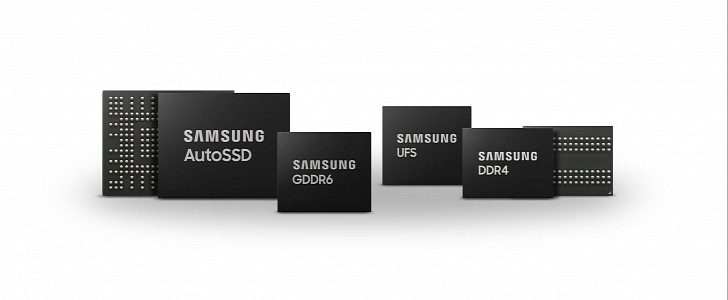There’s a lot happening at Samsung these days, as the South Korean tech giant is now getting ready for several big announcements in multiple industry sectors.
January is the month when the company is expected to announce both the Galaxy S21 FE and the all-new Galaxy S22, and obviously, Samsung wants to make sure everything is working exactly as it wants it to work. Especially given these two smartphones spearhead its offering in the high-end and premium mid-range categories, that is.
But on the other hand, Samsung still has enough time to focus on an industry it’s betting big on in the long term.
The company has announced that it started the production of a series of new chips for the automotive sector, this time specifically aimed at electric vehicles and self-driving cars.
The new products that entered mass production this week include DDR4 RAM memory, GDDR6 graphics memory, a UFS storage chip, and an SSD, all specifically built to handle the operations that are typically taking place in a modern car.
To prepare these new models for the next generation of cars, Samsung has tried to boost its capabilities to a whole new level. For example, the 256GB SSD is 7 times faster than the existing eMMC storage chips currently available in cars out there when it comes to sequential read speeds.
The main benefit of Samsung’s new lineup is that it allows for faster and more advanced capabilities in the car. The company says its products can power not only autonomous driving but also tasks that many drivers are now considering a must-have, such as navigation with high-definition maps, video streaming, and even 3D gaming.
Samsung says its automotive solutions have already met the AEC-Q100 standard, which means they can be safely installed in cars and operate in the most extreme temperatures ranging from -40°C to +105°C.
But on the other hand, Samsung still has enough time to focus on an industry it’s betting big on in the long term.
The company has announced that it started the production of a series of new chips for the automotive sector, this time specifically aimed at electric vehicles and self-driving cars.
The new products that entered mass production this week include DDR4 RAM memory, GDDR6 graphics memory, a UFS storage chip, and an SSD, all specifically built to handle the operations that are typically taking place in a modern car.
To prepare these new models for the next generation of cars, Samsung has tried to boost its capabilities to a whole new level. For example, the 256GB SSD is 7 times faster than the existing eMMC storage chips currently available in cars out there when it comes to sequential read speeds.
The main benefit of Samsung’s new lineup is that it allows for faster and more advanced capabilities in the car. The company says its products can power not only autonomous driving but also tasks that many drivers are now considering a must-have, such as navigation with high-definition maps, video streaming, and even 3D gaming.
Samsung says its automotive solutions have already met the AEC-Q100 standard, which means they can be safely installed in cars and operate in the most extreme temperatures ranging from -40°C to +105°C.






